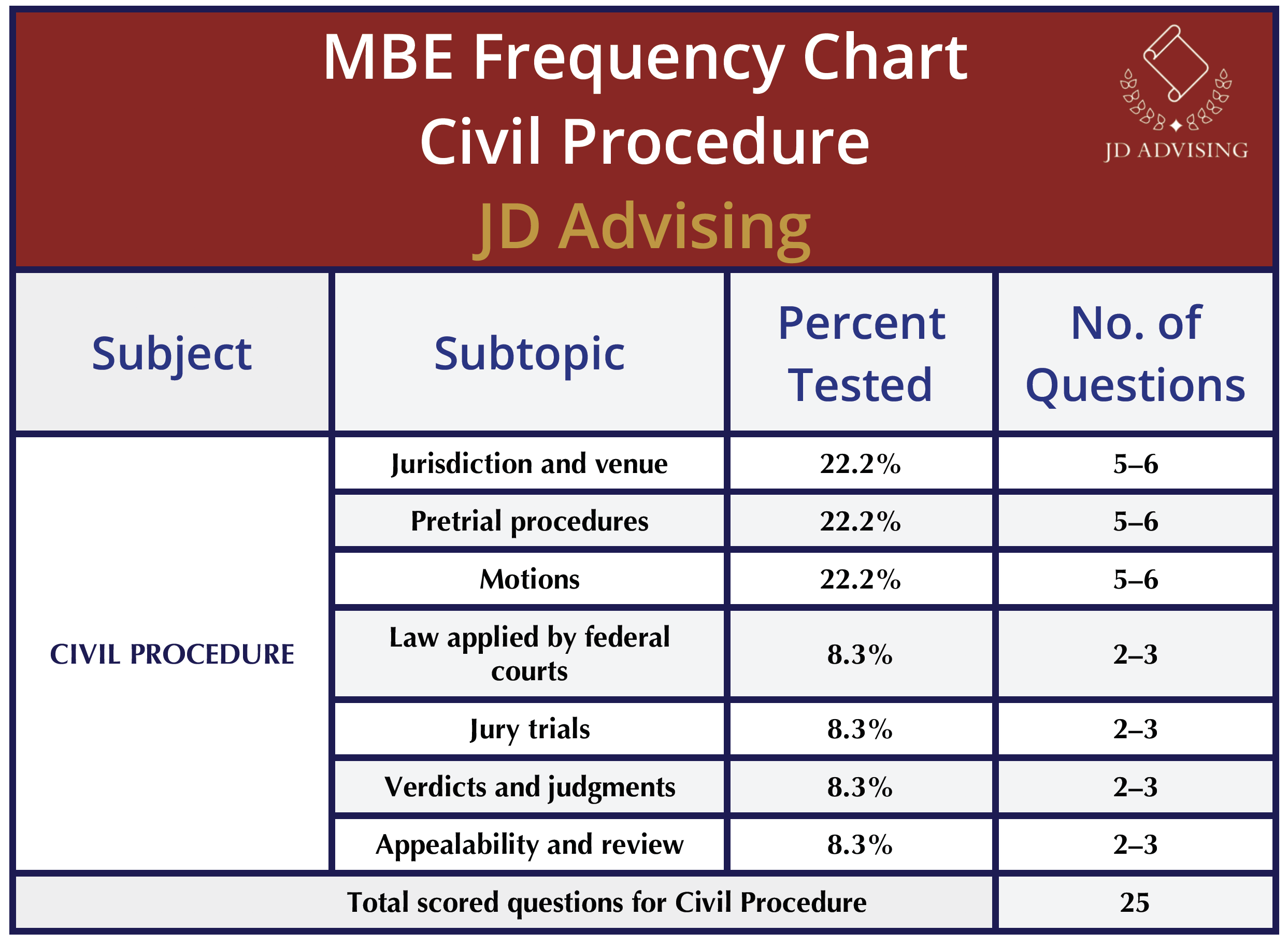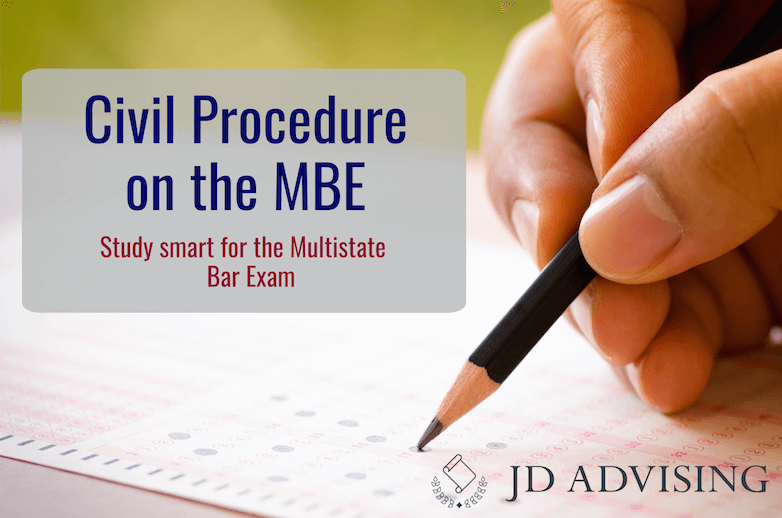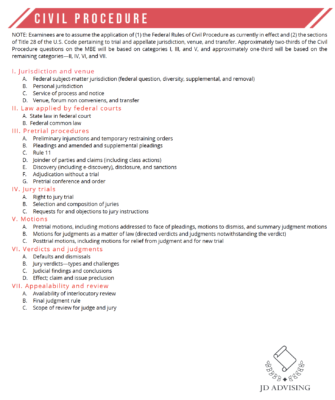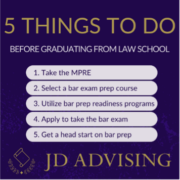Topic 5: Civil Procedure on the MBE: Key Topics
Please see our new, most updated, free MBE Guide here!
Civil Procedure on the MBE: Key Topics
Here, we cover Civil Procedure on the MBE! Out of the 175 scored multiple-choice questions, you can expect to see 25 scored Civil Procedure ones. The National Conference of Bar Examiners (NCBE) breaks down the subject into seven categories of topics, with three emphasized particularly heavily. The other four have much less weight. Here, we tell you what these highly tested categories of topics are and how to approach them.
We sell a Civil Procedure-only exam here.
Civil Procedure on the MBE: Breakdown by Topic
Below is a chart of how Civil Procedure is tested on the MBE. You can see that the first three topics—jurisdiction and venue, pretrial procedures, and motions—make up 66.6% of the scored MBE questions. Thus, these are the most important topics to learn. However, you don’t want to ignore the other four topics, since they will still compose close to 33.3% of the MBE questions. 
Civil Procedure on the MBE: NCBE Subject Matter Outline
This Civil Procedure subject matter outline is promulgated by the NCBE (and re-styled by JD Advising). You can see the seven primary Civil Procedure categories that are tested as well as the topics tested within those categories. The NCBE subject matter outline is available for download here if you prefer to see it in PDF form. Any of the issues listed in the NCBE’s outline are ripe for testing in Civil Procedure on the MBE.
Civil Procedure on the MBE: Key Topics
The NCBE has broken civil procedure down into seven categories: jurisdiction and venue, pretrial procedures, motions, the law applied by federal courts, jury trials, verdicts and judgments, and appealability and review. We’ll take each of these in turn, concentrating on the ones tested more heavily.
Jurisdiction and venue
You will see 5–6 jurisdiction and venue questions in Civil Procedure on the MBE. All of the topics in this section have many nuances. You should spend a decent amount of time focusing on understanding these concepts and the theories behind the rules. First, it is important to understand when personal jurisdiction is an issue as opposed to subject matter jurisdiction. If the defendant is arguing that it isn’t fair to sue him in this court, he is raising a personal jurisdiction issue. He is claiming that the court does not have jurisdiction over him. If the defendant is arguing that this case can’t be brought in this court, he is raising a subject matter jurisdiction issue. He is claiming that the court doesn’t have jurisdiction over this specific case. If you can identify the issue, you can eliminate any answer choice that uses language from the wrong concept!
Service of process is another topic with many nuances that the NCBE likes to test. In order to determine what methods of service are appropriate, you need to read the facts carefully! Pay attention to whether the court is state or federal, the state the court is located in, the state where the defendant was served, and whether the defendant is an individual or a corporation. Each state has their own permissible methods. If the court is a federal court and the defendant is an individual, then anyone who is at least 18 years old and not a party can serve the individual using one of the following four methods (remember the mnemonic “SAID”):
- (1) state law methods: use the state law methods where the court sits or where the defendant is served,
- (2) agent: serve an agent of the individual,
- (3) individual: serve the individual directly, and
- (4) dwelling: leave the summons at the individual’s dwelling with someone of suitable age and discretion who lives there.
If the court is a federal court and the defendant is a corporation, then the same state method rules apply, with the additional option of serving an officer or managing agent authorized to receive service.
Pretrial procedures
You will see about 5–6 pretrial procedures questions in Civil Procedure on the MBE. Pretrial procedures topics involve a lot of timing requirements, so it can be helpful in your studying to create a timeline to help you remember the deadlines for completing each step! Don’t forget that a pleading can be amended once as a matter of course within 21 days of service or after a responsive pleading or pre-answer motion is filed. Otherwise, consent of the court or other party is needed.
Another topic that can bring some confusion is joinder. Make sure you remember the vocabulary! Claims can be joined through:
- counterclaims (a claim filed by a defendant against a plaintiff) or
- cross-claims (a claim asserted by one party against a co-party).
Parties also can be joined in one case:
- permissive joinder (multiple plaintiffs suing a defendant, or a plaintiff(s) suing multiple defendants),
- impleader (defendants may implead a new claim against a new party if that party may be liable to the defendant for all or part of any recovery that the plaintiff obtains),
- intervention (a nonparty moves to become a party), or
- interpleader (the holder of a property subject to conflicting claims may file a lawsuit as a plaintiff and join all claimants).
It is important to keep all of these rules straight!
Motions
You will see about 5–6 questions on motions in Civil Procedure on the MBE. It is critical to remember what defenses or challenges can be raised at which stages of the proceedings. Any challenge based on lack of personal jurisdiction, insufficient service of process, or improper venue must be raised in the first responsive pleading (answer or motion). If you have a hard time remembering this, remember that these have to be raised right away because they have to do with fairness to the defendant. If it was not fair to the defendant, then he would raise them right away! Affirmative defenses such as res judicata and the statute of limitations must be raised in the first answer.
A motion raising the issue of subject matter jurisdiction can be brought at any time, even on appeal! The rationale for this is if the court does not have the power to hear the case, then it can be brought to the court’s attention at any time—if it really doesn’t have the power to make any decisions at all. So this can even be brought on appeal. The required timing to file certain motions should also find its way into your timeline.
Law applied by federal courts
You will see about 2–3 questions on the law applied by federal courts in Civil Procedure on the MBE. You might remember this subject from law school as the Erie doctrine. The NCBE can get very creative in how it tests this topic, but the general rule is relatively simple: A federal court sitting in diversity must apply the substantive law of the state in which the court sits, including the state’s conflict of laws rules. However, federal courts will apply federal procedural law in diversity cases. The trick becomes identifying what is a procedural and what is a substantive issue! If you keep track of the issues you see come up (e.g., the federal court will apply the federal rules regarding right to a jury trial, but state rules when it comes to choice-of-law decisions etc.) you should start to answer these correctly, as you will see the same issues tested over and over again. It is not as hard on the bar exam as it was in law school!
Jury trials
You will see about 2–3 jury trial questions in Civil Procedure on the MBE. The Seventh Amendment preserves a right to a jury trial in all suits at common law where the amount in controversy exceeds $20. For an issue triable by jury, a party can demand a jury trial by serving the other parties a written demand (which can be in a pleading) “no later than 14 days after the last pleading directed to the issue is served” and filing the demand. . Otherwise, there will be a waiver, but the court can overrule this waiver. Remember the rationale for this rule: it makes sense that this time requirement exists as if a party requested a jury trial—it may change how the other party prepares its case.
There must be impartiality in the selection of the jury pool, and the judge or attorneys can then question the potential jurors to investigate bias. In federal court, each side gets three peremptory challenges where they can strike a juror for any reason (except race or gender). There is no limit as to the number of jurors that can be stricken for cause (relationship to a party, an interest in the case, etc.).
Jury instructions also are tested in some of the recently released Civil Procedure MBE questions. You should know that a party must object when it is made aware of the jury instructions by the judge or else it loses its right to object later (unless there is a plain error which affects a substantial right). Merely proposing alternative instructions does not constitute an objection.
Verdicts and judgments
You will see about 2–3 verdicts and judgments questions in Civil Procedure on the MBE. One of the trickiest concepts that trip up many examinees is the difference between default and a default judgment. A default occurs when the defendant fails to file a timely answer with the court. A clerk will note this in the case file. So, all a “default” means is that the defendant did not answer—that is it. It does not give the plaintiff any rights! The plaintiff will then still need to seek a default judgment as a default alone has no binding effect or consequences for the plaintiff. A default judgment will be entered upon motion of the plaintiff, assuming that the defendant does not have a good enough reason for failing to answer the complaint. It has the same effect as any other judgment. The clerk can enter a default judgment when the amount sought is a “sum certain” and no notice is required. In all other cases—the most common one on the bar exam being that there is not a “sum certain”—the court may enter a default judgment upon seven-days’ notice if a party has appeared.
Appealability and review
You will see about 2–3 questions on appealability and review in Civil Procedure on the MBE. These questions often will ask whether a certain order or decision is appealable. In general, only final judgments are appealable. There are many exceptions to be aware of: (1) orders constituting final judgments on collateral matters separate from the merits and effectively unreviewable on appeal from a final judgment; (2) orders involving injunctions, garnishments, and other temporary remedies; (3) interlocutory orders by leave; (4) final orders in cases involving multiple claims and parties and some are still pending; and (5) orders granting or denying a JNOV, directed verdict, or denial of a new trial. Be on the lookout for these on the bar exam!
The NCBE loves to test the exceptions!
We go over exactly how Civil Procedure is tested in our MBE Favorites Series and we have released real Civil Procedure MBE questions if you are looking for more help with Civil Procedure on the MBE! We sell a Civil Procedure-only exam here.
Go to the next topic, Topic 6: Constitutional Law on the MBE: Key Topics.
Seeking MBE Assistance?
Seeking MBE Assistance?
- 📘 MBE Guide: Equip yourself with our FREE expert-crafted bar exam and MBE guides.
- Free Bar Exam Resource Center: Discover top resources, articles, and free webinars led by renowned bar exam professionals.
Top Resources as Vouched by our Students:
- MBE One-Sheets: One of our most highly acclaimed bar exam supplements!
- Bar Exam Outlines: Our comprehensive and condensed bar exam outlines present key information in an organized, easy-to-digest layout.
- MBE Private Tutoring: Opt for personalized, effective strategies.
- On Demand Bar Exam Course: Comprehensive bar exam preparation.
- Bar Exam Crash Course and Mini Outlines: Acclaimed and effective for a quick refresher.
- MBE Mastery Class, Real MBE Questions, and MBE Guide: Elevate your MBE preparation with these high-quality MBE supplements!
🔥 NEW! Check out our Repeat Taker Bar Exam Course and get introduced to our unmatched platinum Guarantee Pass Program.






Leave a Reply
Want to join the discussion?Feel free to contribute!